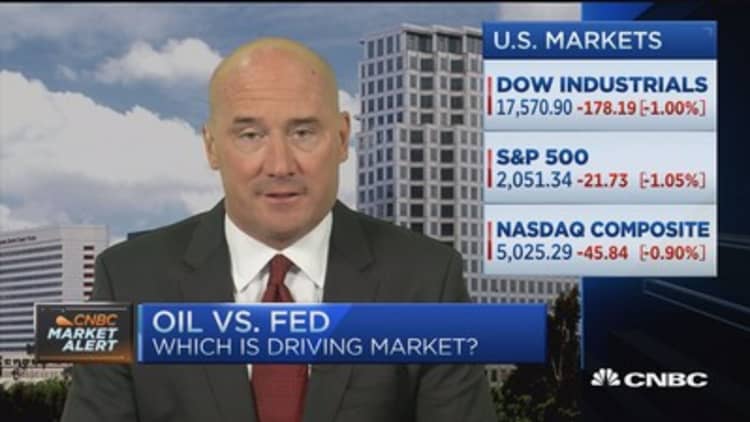
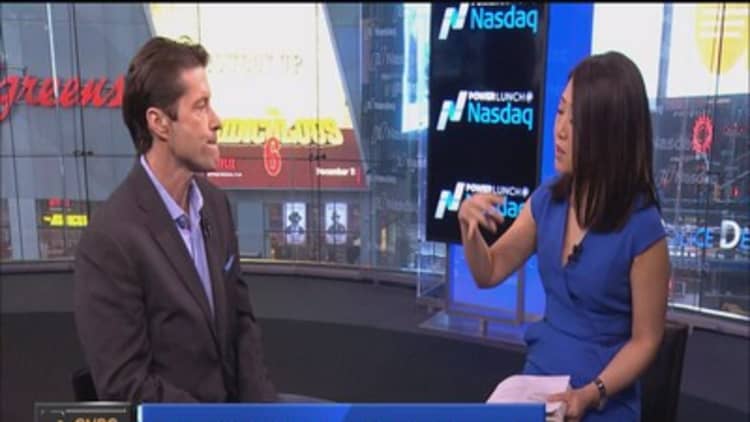
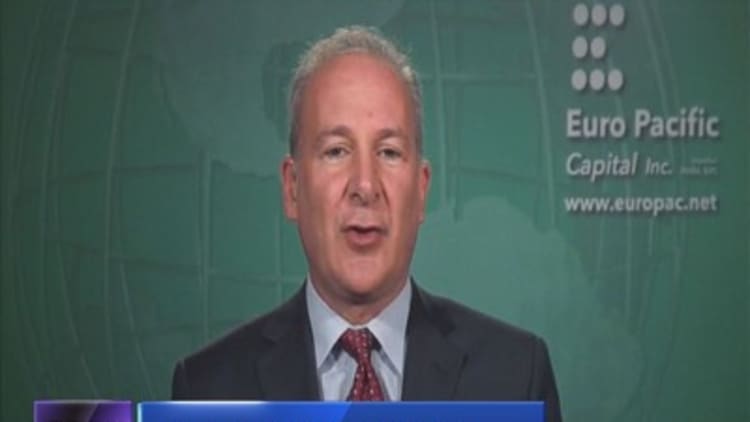
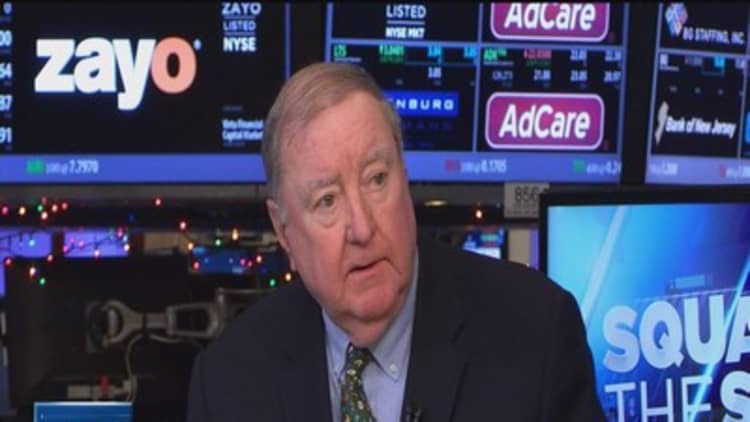
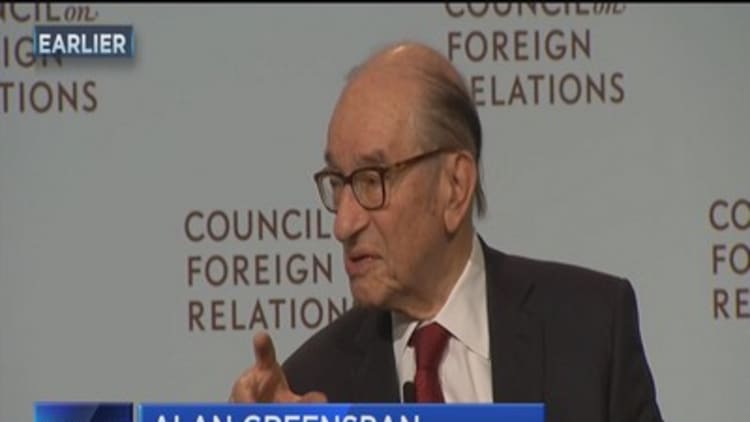
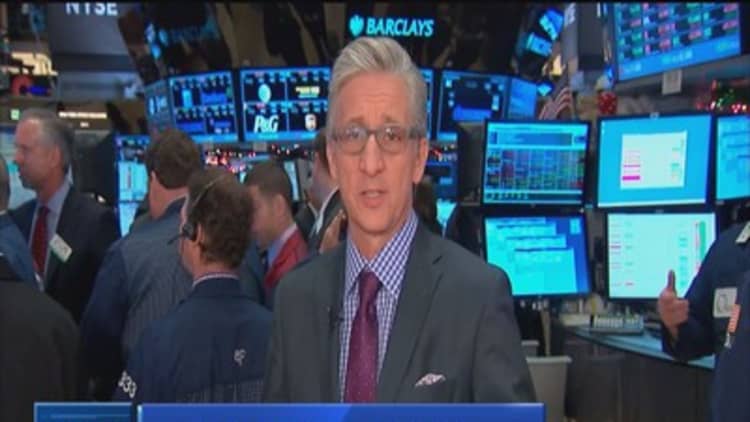
U.S. stocks closed near session lows Thursday as investors eyed oil prices and economic data, after the Federal Reserve on Wednesday made the widely expected move of raising rates. (Tweet This)
"The action we saw yesterday I think was a relief rally," said David Schiegoleit, managing director of investments at U.S Bank Private Client Reserve.
"I think the market has moved beyond that. Oil continues to fall (Thursday). Energy shares have fallen and that has dragged the market down with it," he said.
Three-day performance: DJIA
WTI crude oil (Jan. 16)
Source: FactSet
Analysts also noted markets could see some volatility ahead of options expiration Friday.
The major U.S. averages broke a three-day win streak to close down more than 1 percent each. The S&P 500 was the worst performer, falling 1.5 percent back into negative territory for 2015.
The Dow Jones industrial average ended about 250 points lower as selling accelerated into the close. Goldman Sachs was the greatest weight on the index, while UnitedHealth was the only gainer.
"This market's kind of just back and forth because of a lot of hot money. A lot of it's commodities. There's a lot of positioning going on," said Bernie Williams, chief investment officer, Investment Solutions, USAA Wealth Management.
Energy fell almost 2.5 percent to lead nearly all S&P 500 sectors lower. Only utilities held slight gains.
U.S. crude settled down 57 cents, or 1.6 percent, at $34.95 a barrel, its lowest since February 2009. Brent settled about 0.9 percent lower at $37.06 a barrel, its lowest in nearly seven years.
Natural gas ended 1.96 percent lower at $1.755, its lowest since March 1999.
Read MoreThis could be what drives stocks next year
"The markets are a little worried about how strong the U.S. economy is, how much strong dollar it can take, and commodities (declining) again," said John Bredemus, vice president at Allianz Investment Management.
The U.S. dollar held about 1.3 percent higher against major world currencies, with the euro near $1.081. The yen was near 122.71 yen against the greenback in the close.
Gold futures for February delivery settled down $27.20 at $1,049.60 an ounce. Newmont Mining and Freeport-McMoRan plunged 7.7 percent and 8.5 percent, respectively, to lead decliners in materials, the second-greatest laggard in the S&P. Copper also declined.
Treasury yields held a touch lower, with the below 1 percent and the 10-year yield around 2.23 percent.
As most expected, the U.S. central bank on Wednesday raised its target funds rate by a quarter point, while emphasizing a gradual and data-dependent pace of future tightening. The hike was the first since June 2006.
Read MoreInterest rate hike: What you need to know
"It was pretty much everything they said they were going to do. Obviously the rate hike was a quarter-point which they telegraphed, and (they remained) accommodative," said Peter Coleman, head trader at Convergex.
"The continued problem we have is still oil going down. ... If you see a significant drop in oil you probably see a drop in the market again on a short-term basis," he said. Still, "you got some certainty (on the Fed). You may see some sector rotation."
U.S. stocks rallied after the Fed announcement Wednesday afternoon to close sharply higher, with the S&P 500 in the green for 2015. Stock index futures traded higher ahead of the open, following overnight gains in overseas equities.
European stocks ended higher, off session highs, while Asian equities closed higher with the Nikkei up more than 1.5 percent.
Nick Raich, CEO of The Earnings Scout, said the Fed's move is "not going to remove macroeconomic uncertainty."
"Most of the economic data, revenue data we've collected is not getting better. It's getting worse. The uncertainty is not being lifted by any measure for the overall economy," he said.
In economic news, the Philly Fed index for December was minus 5.9, the lowest of the year after a positive 1.9 print in November.
Leading indicators for November showed a 0.4 percent rise, with October unrevised, up 0.6 percent, according to StreetAccount. Initial claims came in at 271,000.
The U.S. current account deficit in the third quarter increased 11.7 percent to $124.1 billion, its highest level in nearly seven years, as a strong dollar weighed on exports and the profits of multinational corporations, the Commerce Department said.
Major U.S. Indexes
In corporate news:
General Mills missed on both the top and bottom line. The food producer saw revenue drop in all its retail categories, but the company did say the results are in line with its expectations. The stock closed down 3.3 percent.
Accenture fell 5.3 percent after the firm missed on earnings but beat on revenue due to growth at its consulting business.
FedEx posted earnings that topped on both the top and bottom line. The delivery firm attributed the outperformance to larger profit margins and lower costs, among other factors. Shares of FedEx closed up 2 percent.
Oracle beat on earnings but missed on revenue, under pressure from the strong dollar. The business software company gave lower-than-expected numbers for the current quarter as it continues its transition from traditional software to a cloud-based subscription model. The stock closed nearly 5.1 percent lower.
Apple announced Thursday that Jeff Williams has been named chief operating officer. Williams joined the company in 1998 and has overseen the company's entire supply chain since 2010. The stock fell 2.1 percent.
Read MoreEarly movers: GIS, ACN, WGO, FDX, LL, LLY, PLAY, VRX, AIG, QCOM & more
The major U.S. averages are on track for weekly gains of more than 1 percent, as of Thursday's close.
The Dow Jones industrial average closed down 253.25 points, or 1.43 percent, at 17,495.84, with Caterpillar leading decliners and UnitedHealth the only advancer.
The Dow transports closed down 2 percent, with Norfolk Southern leading decliners.
The closed down 31.18 points, or 1.50 percent, at 2,041.89, with energy leading nine sectors lower and only utilities holding higher.
The Nasdaq composite closed down 68.58 points, or 1.35 percent, at 5,002.55.
The CBOE Volatility Index (VIX), widely considered the best gauge of fear in the market, climbed to near 19.
About two stocks declined for every advancer on the New York Stock Exchange, with an exchange volume of 959 million and a composite volume of nearly 4.3 billion in the close.
—CNBC's Peter Schacknow contributed to this report.
On tap this week:
Thursday
4:30 p.m.: Fed balance sheet/money supply
Friday
9:45 a.m.: Services PMI
10 a.m.: Atlanta Fed biz inflation expectations
11 a.m.: Kansas City Fed manufacturing index
1 p.m.: Richmond Fed President Jeffrey Lacker speaks on economy
*Planner subject to change.
More From CNBC.com:






